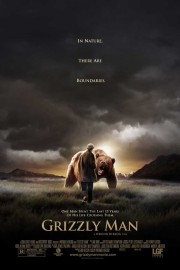Grizzly Man
Originally Written: August 2005
“Grizzly Man” is the work of two filmmakers. The first is Werner Herzog, a German director known for his scope of vision and ideas and his explorations of themes such as pride and ambition (prior to this film, my only experiences with Herzog were the 1972 masterpiece “Aguirre: The Wrath of God” and his 1979 remake of the silent masterwork “Nosferatu”). For “Grizzly Man,” Herzog has created a 100 minute documentary culled from 100 hours of footage by Timothy Treadwell that was shot between 1998-2003. Treadwell is a fascinating character- from 1990 to 2003 he spent the summer months of the year in a National Park in Alaska living among the grizzly bears and other wildlife- specifically foxes- studying them, in awe of them and the wonders of their life, and calling himself their “protector.” During the rest of the year he would go to schools and discuss his “adventures” with kids for no fee.
It’s easy to see why Herzog- whose films (as is my understanding) explore the darker side of human nature and madness- was drawn to Treadwell watching the footage he has compiled- Treadwell is an iconoclast along the lines of Aguirre and Herzog himself, a man with great ambition and singular personality, whose personal image of himself is created through equal parts madness and awe of what they do (Herzog has been said to discuss the “voodoo of location,” and in “Aguirre” and other films, went to tremendous lengths for realism in his scripted features). Treadwell- who was killed by a bear on his 2003 expedition- believes he is protecting the bears, even though he lacks probably a tenth of the strength of any of these bears, he hides (though still tapes) when poachers come to look for trophies and torment the bears, and the fact that the bears are on a National Park actually provides them with more protection than Treadwell- who himself violates wildlife regulations on these trips (his profanity-laden tirades on the Parks officials are a comic highpoint in their delivery)- ever could. He names these bears and foxes, he acts as if he has truly made friends with them, he acts as if they accept him being in their territory. Of course, a less courageous individual could not pull off this dangerous expedition (althought I guess you could Treadwell didn’t in the end, the bear that killed him and his then-girlfriend was supposedly not one that Treadwell had known through the years)- say what you will about his intelligence in taking on such a task, but Treadwell had the conviction and audacity of a real-risktaker, which would explain why- in his footage- he does look to have established himself among the bears. Few nature docs have as much fascination value in their makers- usually just quiet observers- as they do in their subjects (this summer’s wonderful hit “March of the Penguins” looks boring in comparison), but even fewer have directors with Herzog’s imagination and ambition.
“Grizzly Man” is unexpectedly funny. I mean really really funny. Sometimes it’s what Treadwell is doing (him doing multiple, consecutive “takes” on speeches). Sometimes it is what he’s saying (he has a speech on his sexuality that is hilarious in its’ honesty, and his grandiose ideas of himself are amusing). Sometimes it is what he’s fascinated by (a pile of shit a bear just squeezed out inspires Treadwell’s awe that it just came from the bear). Treadwell was a failed actor; did he ever try stand-up? In light of the tragedy that haunts “Grizzly Man” and Treadwell’s life, it seems odd to laugh at Treadwell’s onscreen antics, but that natural showmanship is what endears him to the viewer even if we still feel he’s a fool for believing how he does about his forced, unnatural place in this part of nature. This footage also poses the idea as to whether Herzog is making fun of Treadwell; while the director- who sometimes serves as narrator, giving his own subjective views on Treadwell and his ideas in addition to context- makes his feelings known throughout the film, he presents Treadwell’s footage during these comic moments unedited, making them feel like organic humor as opposed to humor that is manipulated in editing to make it funny and in bad taste. Regardless of his own comments during the film, Herzog has too much respect for his subject to add insult to injury by making fun of him- he presents Treadwell as he was, like any great documentary filmmaker does.
If there’s one thing I can find that “Grizzly Man” doesn’t do well, it’s that it doesn’t allow Herzog to fully bloom as he did in “Aguirre” and “Nosferatu” and transform Treadwell’s story into a story of transcendent feeling and vision. But really, it’s hard to fault Herzog for that since in telling Treadwell’s story he’s using not his own footage but Treadwell’s, and Treadwell is such an irreverent individual in his personality that it’d be hard for any filmmaker to find real gravitas in his story. (Though descriptions of his death are given by interviewees, and an audio tape of Treadwell’s death exists- he had his camera on, but the lens cap was still on- and Herzog was allowed to hear it- which we see onscreen- he wasn’t given permission to use it; given his reaction to it though- he tells Treadwell’s friend who has the tape to destroy it and never listen to it- it’s a wiser choice to leave it to the imagination.) But Herzog- with a richly emotive backwoods guitar score by Richard Thompson- nonetheless allows Treadwell a certain grace in the artistic admiration with which he creates this haunting documentary, one of the year’s best.










